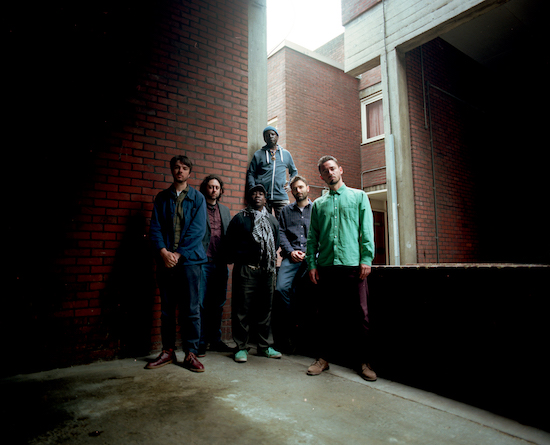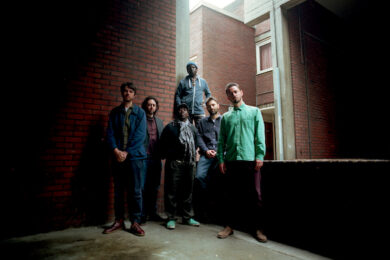Photograph courtesy of Theo Cottle
There have been few fusion albums in the past couple of years that can claim the status of masterpiece, but Owiny Sigoma Band’s third album could certainly make a case for the title. While the British-Kenyan group of artists had already made two enticing albums, it was with last year’s Nyanza that it felt like they had found their calling.
It retained the experimental quality of bringing together East African traditional music with British electronica, but rather than producing something overwhelmingly avant-garde, Nyanza is a warming pop album at its heart. It tells, in almost travelogue-style, the story of the group retreating from Nairobi into the Nyanza region of western Kenya, the familial home of two of their musicians at the time. The result is glorious: all sugary sweet, undulating melodies, intricate, euphoric rhythms and sometimes unsettling but airy found sounds. Even for those of us who haven’t made it to Kenya, listening to Nyanza has the transportive capability to take you to some dreamed-up concept of a balmy evening there.
At its most upbeat, the record is charged with a bacchanalian frenzy – not surprising, given that the song ‘Changaa Attack’ recounts a night imbibing the titular drink, an incredibly potent Kenyan home brew said to sometimes contain traces of jet fuel to give it an extra kick. But there are also more serene, stripped-away moments: the incredibly striking ‘Owour Won Gembe’ or even the laid-back pop of ‘I Made You/You Made Me’.
While the year marked the creation of a beautiful album for the band, it was also marked by loss. The percussionist Charles Owoko sadly passed away in October, and the direction of the band seemed uncertain. Owoko’s work, combined with that of the band’s British drummer Tom Skinner, made for a truly fantastic pairing, and it seemed difficult to conceive of the band being able to proceed.
Happily, however, the group have not called it quits, and when I meet them, they are in the middle of a busy week of rehearsals ahead of this month’s UK tour. I had a chat with brothers Jesse and Louis Hackett (vocals and keyboards/bass, respectively) along with new percussionist Albert Bisaso Ssempeke, who also acted as a translator for nyatiti master, Joseph Nyamungu.
From what I’ve read, your beginnings seem fairly organic. Did you ever think back when this was all starting that you would be sitting here in five, six years’ time doing an interview, promoting a third album and doing another tour?
Louis Hackett: Absolutely not, we had no idea. When we first connected in Kenya, with those first recordings, there was no idea that they would see the light of day. It wasn’t even intended as a recording exploration, it was more just a chance to capture what was happening at that time – a musical exchange. And then it’s just gone through this very organic process that’s taken us six years down the line. There was never an agenda or a plan, things just happened to happen, they took care of themselves.
Jesse Hackett: They haven’t just taken care of themselves – there’s been a lot of hard work involved!
LH: [laughs] Sorry, that was slightly understated; there obviously has been a lot of work. Not all of it just magically happened.
JH: Strangely, every time we’ve been faced with challenges or odds stacked against us in one form or another, some good luck has just fallen upon us and it means that we’ve been able to continue as a group.
LH: This particular tour wouldn’t have happened if it wasn’t for the Arts Council. They gave us a grant that made this tour feasible; before that we were facing the prospect that we weren’t going to be able to afford to do another tour.
JH: Also after the death of Charles, we weren’t really sure how to proceed or if it was going to be possible. But we took a bit of a gamble, and we decided to try to keep going without him, to keep the music alive. We also brought in a new member: Albert, from Uganda. It’s all seemingly working out quite nicely – we feel quite lucky that we’ve been able to keep going.
So you will be releasing more music?
JH: Yeah! We’ve actually got a new record coming out quite soon; I’m not sure if I’m meant to be saying too much about it but I think we’ll be doing a collection that spans across all of our recordings. So the things that never made it onto the albums: off-cuts, demos and rarities, that kind of record. And actually because we have a new group – a different guitar player with us, and we have Albert who’s brought about ten different traditional instruments with him from Uganda – the sound has really changed. So I think it would be wonderful to capture the sound of this band; it’s an evolution. And I know [Joseph] Nyamungu wants to make album number four, right?
Albert Bisaso Ssempeke: Yes, so he’s saying that music has a certain language, no matter where you come from. Nyamungu is from Kenya, but he’s playing with these guys from here, and music connects itself, and it’s a way of getting together and speaking one language. They speak English, he speaks Swahili, but the music connects them.
On the topic of these two cultures coming together, recently there’s been quite a lot of debate regarding cultural misappropriation. Do you find that you have to keep that in mind, that there has to be a certain line with what you’re doing?
JH: What do you mean by that?
Not so much in music, I suppose, but in popular culture in general right now there’s a lot of debate about say, for example, whether white girls can wear bindis, because they’re inherently related to Indian culture. If you’re not part of a culture, should you be trying to refashion it? But I guess with music there’s always been more of an idea of exchange?
JH: I think it all depends on how it’s done. If it’s done with respect, if it’s done tastefully, then it’s original; you’ve come up with something that’s a hybrid. As long as the people creating the music are respecting one another and nobody’s taking advantage of one another’s ideas then I think it’s fine. It’s always been the way: musicians and artists and everyone on this planet borrows ideas from one another. It really depends on how they’re put across and the motive, what they’re promoting and the ideology. For us it’s not particularly political or anything, it’s just about the music and the sound that we make. It’s a big experiment.
LH: And there’s the fun that we have, which I think has fundamentally kept this going.
JH: You can look at us and it might seem a weird mix – and it is. We’re from very different parts of the world, and there are differences culturally and economically. But when we get together and play music, none of that really matters. We’re just sharing a language and we’re trying to create something new that we enjoy, and that we find fun. Hopefully other people do too, and that’s the basic philosophy. We’ve spent a lot of time together, we’ve been through a lot of experiences together and we’re all as one. As long as things are equal, then that’s fine – we all benefit from this.
So when you went to Nyanza, what was the reaction like to the more electronic and dance music elements you had brought to a traditional type of music?
LH: I think it was a real mixed reception. Some people found it to be really intriguing and responded well to it, I think other people were quite confused and a couple of little kids cried – so that’s always a good sign really! We covered a lot angles.
Some very emotional responses.
LH: Yeah, I mean it was beautiful. A lot of the work was done there, a lot was done in England, it’s been back and forth. But we haven’t really done many gigs in that environment in Kenya, so it was great to get a chance to all play together in such a remote setting and represent this traditional music in a completely different fashion. It’s an experience that I don’t think any of us will ever forget.
JH: [To Albert] Can you ask Nyamungu what his friends and family from his village thought when we played?
ABS: So he’s saying that when they saw them playing, the people in Kenya loved the music and the style because it’s a new music that they’d never experienced. They’re still asking for the band to go back and play.
JH: That’s good!
ABS: Another thing he’s saying is that the instrument he plays – the nyatiti, or a kind of lyre – people thought that it was no longer relevant. But when they saw it back, and played in a different form, they got more interested in the nyatiti. So this music has had a very big impact, because people are getting interested in learning an instrument that they had never bothered to learn.
JH: So he’s getting more work as a teacher now, because of the band?
ABS: Kids from the ages of ten to 15 are coming to him and forcing their parents to let them learn! He’s saying that he never went to school, but the nyatiti has brought him to many educated people. He’s flown from Kenya to Europe to play and perform for educated people. So now local people are seeing him in a different perspective, and it’s why students are going to him. They think that if they learn this instrument, they might also fly and get opportunities!
You’re currently getting ready for your UK tour. What can we expect?
JH: We’ll be playing stuff from all three albums. We’ve got a lot of different songs to try out, it’s a different live line-up now. Albert’s really brought a very different energy to the band, so the instrumentation will be slightly different. It feels as though we’re getting back to something quite rootsy and organic somehow, as well as doing some of the more stripped-back electronic stuff. It’s not restricted to album format in that atmosphere, so there’s room to jam. We leave our music quite loose, so there’s quite a lot of room for things to happen naturally and spontaneously. Hopefully it will have that kind of upbeat, party energy. Or that’s what we’re hoping for anyway.
Nyanza is out now on Brownswood Recordings. Owiny Sigoma Band play Colston Hall in Bristol tonight, Rich Mix in London tomorrow, St. Clement’s Church in Chorlton, 28, and The Welfare in Swansea, 29; for full details and tickets, head here



